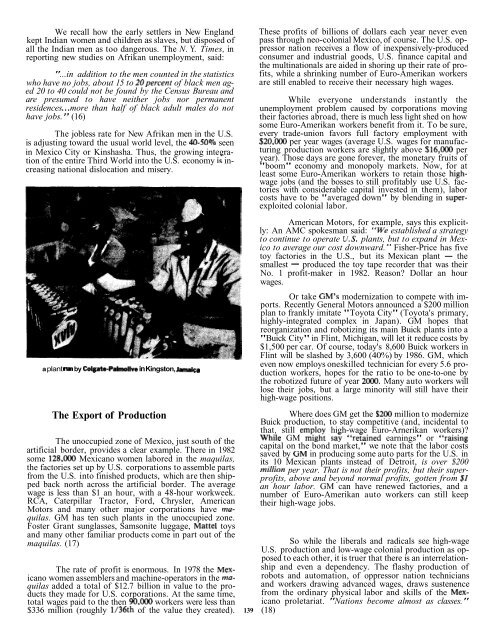sakaisettlersocr
sakaisettlersocr
sakaisettlersocr
Create successful ePaper yourself
Turn your PDF publications into a flip-book with our unique Google optimized e-Paper software.
We recall how the early settlers in New England<br />
kept Indian women and children as slaves, but disposed of<br />
all the Indian men as too dangerous. The N. Y. Times, in<br />
reporting new studies on Afrikan unemployment, said:<br />
"...in addition to the men counted in the statistics<br />
who have no jobs, about 15 to 20percent of black men aged<br />
20 to 40 could not be found by the Census Bureau and<br />
are presumed to have neither jobs nor permanent<br />
residences ... more than half of black adult males do not<br />
have jobs. " (16)<br />
The jobless rate for New Afrikan men in the U.S.<br />
is adjusting toward the usual world level, the 40-50% seen<br />
in Mexico City or Kinshasha. Thus, the growing integration<br />
of the entire Third World into the U.S. economy is increasing<br />
national dislocation and misery.<br />
a plant MI by Colgate-Paknollve in Kingston, JPndca<br />
The Export of Production<br />
The unoccupied zone of Mexico, just south of the<br />
artificial border, provides a clear example. There in 1982<br />
some 128,000 Mexicano women labored in the maquilas,<br />
the factories set up by U.S. corporations to assemble parts<br />
from the U.S. into finished products, which are then shipped<br />
back north across the artificial border. The average<br />
wage is less than $1 an hour, with a 48-hour workweek.<br />
RCA, Caterpillar Tractor, Ford, Chrysler, American<br />
Motors and many other major corporations have maquilas.<br />
GM has ten such plants in the unoccupied zone.<br />
Foster Grant sunglasses, Samsonite luggage, Matte1 toys<br />
and many other familiar products come in part out of the<br />
maquilas. (17)<br />
The rate of profit is enormous. In 1978 the Mexicano<br />
women assemblers and machine-operators in the maquilas<br />
added a total of $12.7 billion in value to the products<br />
they made for U.S. corporations. At the same time,<br />
total wages paid to the then 90,000 workers were less than<br />
$336 million (roughly 1/36th of the value they created).<br />
These profits of billions of dollars each year never even<br />
pass through neo-colonial Mexico, of course. The U.S. oppressor<br />
nation receives a flow of inexpensively-produced<br />
consumer and industrial goods, U.S. finance capital and<br />
the multinationals are aided in shoring up their rate of profits,<br />
while a shrinking number of Euro-Amerikan workers<br />
are still enabled to receive their necessary high wages.<br />
While everyone understands instantly the<br />
unemployment problem caused by corporations moving<br />
their factories abroad, there is much less light shed on how<br />
some Euro-Amerikan workers benefit from it. To be sure,<br />
every trade-union favors full factory employment with<br />
$20,000 per year wages (average U.S. wages for manufacturing<br />
production workers are slightly above $16,000 per<br />
year). Those days are gone forever, the monetary fruits of<br />
"boom" economy and monopoly markets. Now, for at<br />
least some Euro-Amerikan workers to retain those highwage<br />
jobs (and the bosses to still profitably use U.S. factories<br />
with considerable capital invested in them), labor<br />
costs have to be "averaged down" by blending in superexploited<br />
colonial labor.<br />
American Motors, for example, says this explicitly:<br />
An AMC spokesman said: "We established a strategy<br />
to continue to operate U. S. plants, but to expand in Mexico<br />
to average our cost downward. " Fisher-Price has five<br />
toy factories in the U.S., but its Mexican plant - the<br />
smallest - produced the toy tape recorder that was their<br />
No. 1 profit-maker in 1982. Reason? Dollar an hour<br />
wages.<br />
Or take GM's modernization to compete with imports.<br />
Recently General Motors announced a $200 million<br />
plan to frankly imitate "Toyota City" (Toyota's primary,<br />
highly-integrated complex in Japan). GM hopes that<br />
reorganization and robotizing its main Buick plants into a<br />
"Buick City" in Flint, Michigan, will let it reduce costs by<br />
$1,500 per car. Of course, today's 8,600 Buick workers in<br />
Flint will be slashed by 3,600 (40%) by 1986. GM, which<br />
even now employs oneskilled technician for every 5.6 production<br />
workers, hopes for the ratio to be one-to-one by<br />
the robotized future of year 2000. Many auto workers will<br />
lose their jobs, but a large minority will still have their<br />
high-wage positions.<br />
Where does GM get the $200 million to modernize<br />
Buick production, to stay competitive (and, incidental to<br />
that. still em~lov high-wage Euro-Arnerikan workers)?<br />
~hae GM might sai ''reTained earnings" or "raisirig<br />
capital on the bond market," we note that the labor costs<br />
saved by OM in producing some auto parts for the U.S. in<br />
its 10 Mexican plants instead of Detroit, is over $200<br />
million per year. That is not their profits, but their superprofits,<br />
above and beyond normal profits, gotten from $1<br />
an hour labor. GM can have renewed factories, and a<br />
number of Euro-Amerikan auto workers can still keep<br />
their high-wage jobs.<br />
So while the liberals and radicals see high-wage<br />
U.S. production and low-wage colonial production as opposed<br />
to each other, it is truer that there is an interrelationship<br />
and even a dependency. The flashy production of<br />
robots and automation, of oppressor nation technicians<br />
and workers drawing advanced wages, draws sustenence<br />
from the ordinary physical labor and skills of the Mexicano<br />
proletariat. "Nations become almost as classes."<br />
139 (18)


